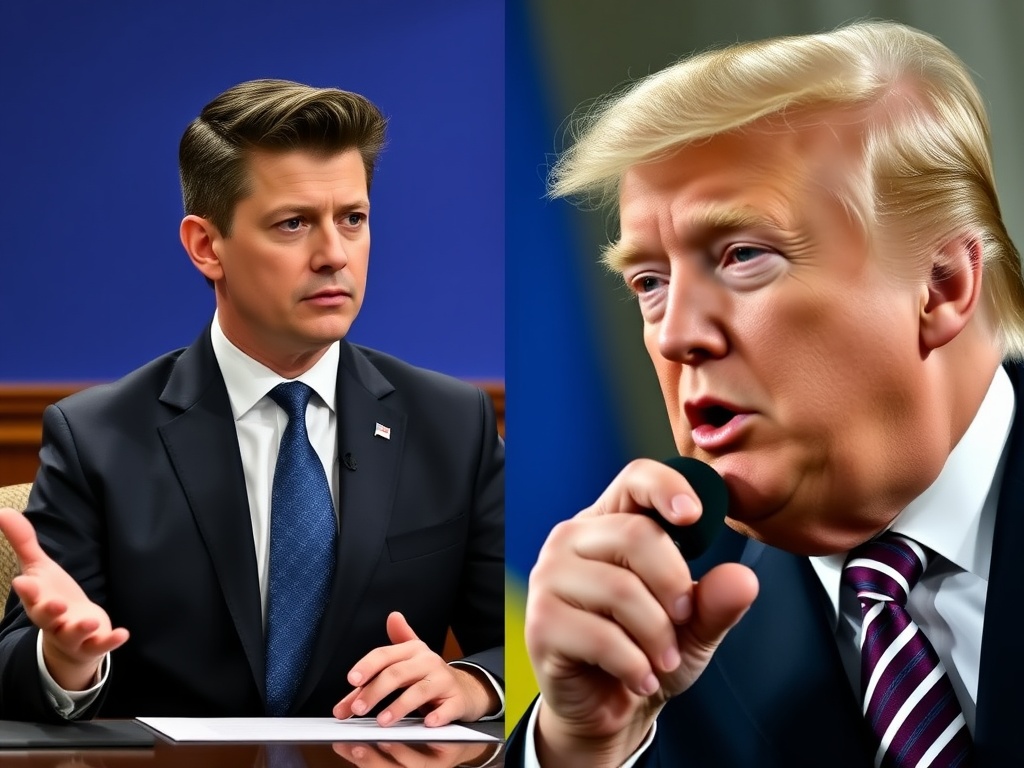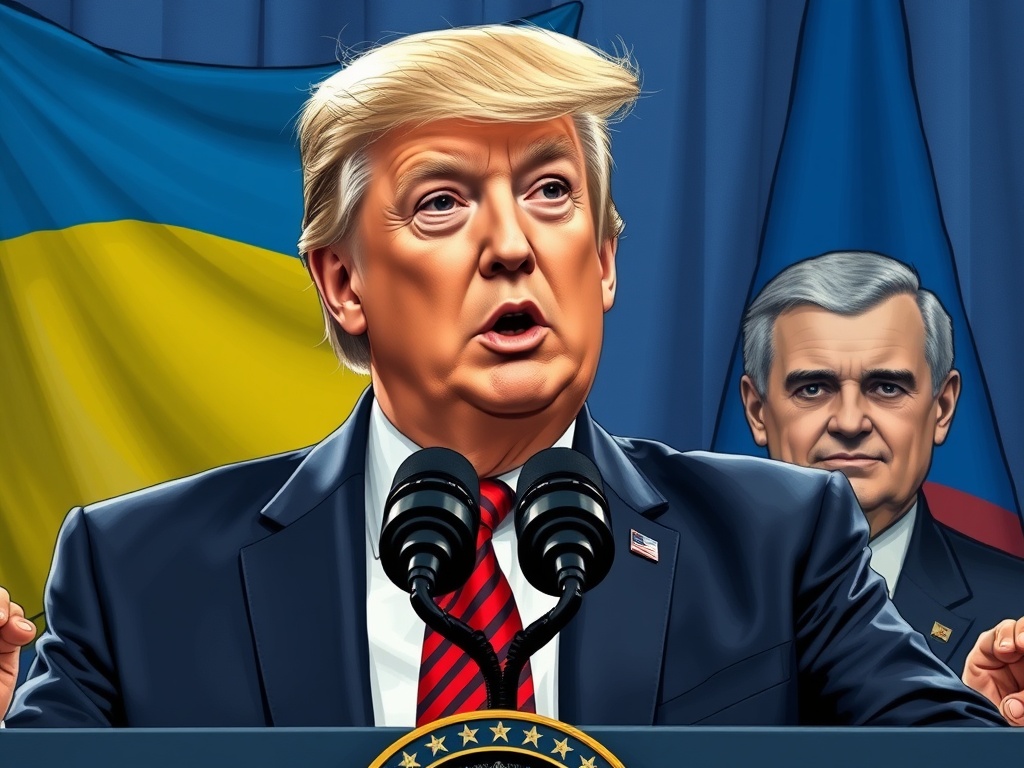Trump’s Controversial Claims on Ukraine and Zelensky
Recently, former President Donald Trump has reiterated several contentious and factually incorrect assertions regarding the ongoing war in Ukraine and the leadership of President Volodymyr Zelensky. Known for his history of making unfounded claims, including his persistent insistence that he won the 2020 presidential election, Trump’s latest remarks have raised eyebrows and elicited strong reactions even from his staunch allies. He referred to Zelensky as a “dictator” and falsely stated that Ukraine instigated the conflict with Russia. These assertions have sparked outrage and disbelief. Below are the specific claims made by Trump, along with the facts.
‘You Should Have Never Started It’

What Trump said: Trump commented, “Today I heard, ‘Oh well, we weren’t invited,’” in reference to Ukraine’s grievances about not being included in recent peace negotiations. He added, “Well, you’ve been there for three years. You should’ve ended it after three years. You should’ve never started it. You could’ve made a deal.”
How Zelensky responded: Zelensky expressed his disappointment, stating, “Unfortunately, President Trump – I have great respect for him as a leader of a nation that we have great respect for, the American people who always support us – unfortunately lives in this disinformation space. I would like Trump’s team to be more truthful; all of this definitely doesn’t affect Ukraine in a positive way… I think Putin and Russia are really happy because they are involved in discussions, and yesterday there were signals that they are the victims. That is something new.”
Fact check: The facts indicate that Russia commenced its full-scale invasion of Ukraine on February 24, 2022, launching an unprovoked war of aggression. The Russian government claimed the purpose of the “special military operation” was to “demilitarize and denazify” Zelensky’s pro-Western administration and to prevent Ukraine from joining NATO. This invasion followed years of hostility, including Russia’s annexation of Crimea in 2014 and the conflict in Eastern Ukraine that began after the ousting of the pro-Russian president Viktor Yanukovych. Prior to the invasion, the United States declassified intelligence that revealed Russia’s plans for a full-scale attack, while Zelensky had expressed a willingness to engage in discussions to avert such a conflict. The Kremlin’s narrative has consistently attempted to place blame on Ukraine for provoking the war.
Zelensky is a ‘Dictator’
What Trump said: Trump declared, “[Zelensky] refuses to have elections, is very low in Ukrainian polls, and the only thing he was good at was playing Biden ‘like a fiddle’. A dictator without elections, Zelensky better move fast or he is not going to have a country left.” This outburst on Truth Social followed Zelensky’s assertion that Trump was trapped in a “disinformation bubble.”
Fact check: President Zelensky was democratically elected in 2019, securing 73% of the vote in a competitive election that respected fundamental freedoms, as noted by independent observers from the OSCE. Although Zelensky’s term was slated to end in May 2024, the ongoing martial law since the Russian invasion has suspended elections. There is little public appetite for elections during wartime, with most opposition parties agreeing that it is not feasible to hold elections while the country is under attack. Ruslan Stefanchuk, the speaker of Ukraine’s parliament, firmly rejected Trump’s calls for elections before establishing a peace deal, stating, “Ukraine needs bullets, not ballots.”
Experts have pointed out the extreme difficulties of conducting an election during wartime due to the high risk of Russian assaults on Ukrainian cities, the exodus of many citizens, and the fact that numerous Ukrainians are either fighting or living under Russian occupation. Zelensky has confirmed that elections will be held post-conflict, suggesting they could happen as soon as the war concludes. He noted, “The elections will take place after the end of the hot phase of the war and the lifting of martial law… but let’s be honest: ending martial law now is exactly what Putin wants.”
Zelensky is ‘at 4% Approval Rating’
What Trump said: Trump asserted, “The leader in Ukraine, I mean, I hate to say it, but he’s down at 4 percent approval rating.”
Fact check: The origin of this 4% figure remains unclear. While Zelensky’s popularity has indeed dipped from the nearly 90% approval ratings he enjoyed at the onset of the war, he still commands significant support among the Ukrainian people. Due to the war, official polling is limited, but a recent survey conducted by the Kyiv International Institute of Sociology revealed Zelensky’s approval rating to be 57%, a slight increase from 52% in December.
Interestingly, Trump’s comments have seemingly galvanized support for Zelensky. Following Trump’s remarks, mayors and MPs from across the political spectrum in Ukraine rallied citizens to stand united behind their leader. Ihor Terekhov, the mayor of Kharkiv, urged on Telegram, “It’s time to unite. Now is not the time to lose faith in our abilities, in our ideals, and in our country. United, we are capable of anything. We can not only resist the external enemy but also overcome any difficulties.”
What Lies Behind Trump’s Comments?
Trump’s tendency to openly side with Russia has sent shockwaves through Ukraine and raised concerns among European leaders about his ultimate strategy. Former British Prime Minister Boris Johnson attempted to downplay the situation, suggesting that Trump’s statements were meant to provoke a reaction. “When are we Europeans going to stop being scandalized about Donald Trump and start helping him to end this war? Of course Ukraine didn’t start the war. You might as well say that America attacked Japan at Pearl Harbor,” Johnson remarked, referencing the surprise military strike during World War II.
Analysts have speculated that Trump’s comments may be a deliberate tactic to nudge parties toward agreements that could benefit the United States, paralleling his past tariff threats directed at countries like Mexico, Canada, and Colombia. John Mearsheimer, a political science professor at the University of Chicago, noted that the U.S. possesses substantial leverage and could potentially persuade Ukraine to accept a deal they might otherwise reject.
Conversely, some analysts argue that Trump, who has not concealed his admiration for authoritarian figures like Putin and North Korean leader Kim Jong Un, may be unwittingly playing into Putin’s hands. Kim Dozier, a global affairs analyst, mentioned that Secretary of State Marco Rubio and National Security Adviser Michael Waltz would likely attempt to guide Trump in avoiding manipulation by Putin, a seasoned intelligence operative.
Others contend that Trump may simply be seeking to project strength by leveraging the powers of the presidency. “I have the power to end this war. And I think it’s going very well,” Trump has remarked. Regardless of the motivations behind his rhetoric, those in Kyiv may be interpreting it as a signal to prepare for potentially unfavorable outcomes in the ongoing peace discussions.




